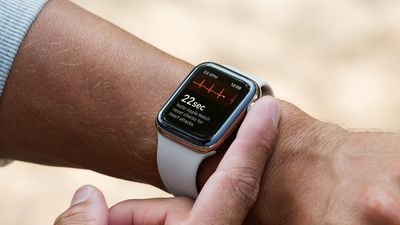Apple Watch Can Accurately Predict Stress Levels, Study Shows
The Apple Watch can accurately predict stress levels, according to a study conducted by researchers at the University of Waterloo, Canada (via MyHealthyApple).

Using the Apple Watch Series 6's ECG sensor, the researchers found that there was a close association between ECG data, including heart acceleration and deceleration capacity, and participants' reported stress levels at the time the readings were taken. Machine learning algorithms were then developed using this information to create a prediction model.
The stress models are said to have a "high level of precision," but lower recall. The study concludes that the Apple Watch has "promising" potential for stress prediction, and proposes that since the device collects additional health information such as sleep and activity information, even more data points could be integrated into stress models to increase their predictive accuracy.
The researchers postulate that the Apple Watch could be used to aid mental health care, offering activities such as breathing exercises to offset stress signals, responding early to changes in mental health. Competing devices from Samsung, Fitbit, and Garmin have offered a stress score feature for some time, but Apple has yet to implement such a feature in its Health app.
Popular Stories
While the iOS 26.3 Release Candidate is now available ahead of a public release, the first iOS 26.4 beta is likely still at least a week away. Following beta testing, iOS 26.4 will likely be released to the general public in March or April.
Below, we have recapped known or rumored iOS 26.3 and iOS 26.4 features so far.
iOS 26.3
iPhone to Android Transfer Tool
iOS 26.3 makes it easier...
Apple recently acquired Israeli startup Q.ai for close to $2 billion, according to Financial Times sources. That would make this Apple's second-biggest acquisition ever, after it paid $3 billion for the popular headphone maker Beats in 2014.
This is also the largest known Apple acquisition since the company purchased Intel's smartphone modem business and patents for $1 billion in 2019....
In 2022, Apple introduced a new Apple Home architecture that is "more reliable and efficient," and the deadline to upgrade and avoid issues is fast approaching.
In an email this week, Apple gave customers a final reminder to upgrade their Home app by February 10, 2026. Apple says users who do not upgrade may experience issues with accessories and automations, or lose access to their smart...
Apple turns 50 this year, and its CEO Tim Cook has promised to celebrate the milestone. The big day falls on April 1, 2026.
"I've been unusually reflective lately about Apple because we have been working on what do we do to mark this moment," Cook told employees today, according to Bloomberg's Mark Gurman. "When you really stop and pause and think about the last 50 years, it makes your heart ...
New M5 Pro and M5 Max MacBook Pro models are slated to launch in the near future, according to information shared with MacRumors by an Apple Premium Reseller.
Subscribe to the MacRumors YouTube channel for more videos.
The third-party Apple retailer said that MacBook Pro stock is very low currently because there is an imminent new product introduction. Apple typically coordinates supply with...






















